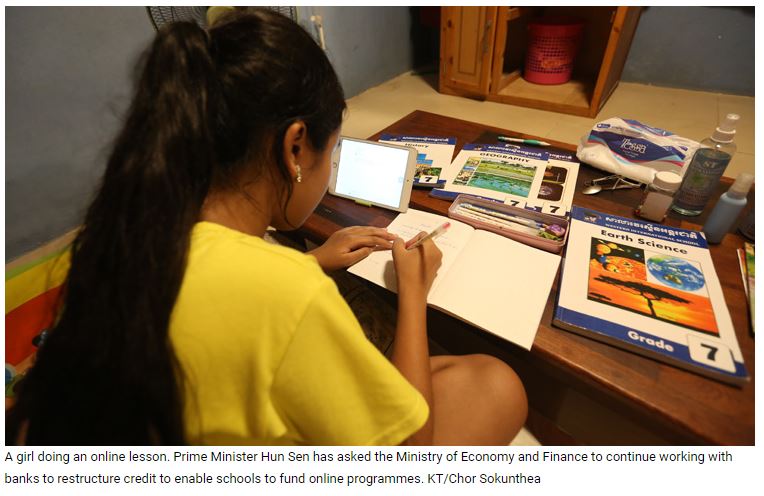Cambodia: Private schools hit hard by income loss
Cambodia’s Prime Minister Hun Sen yesterday expressed concern over private schools that have rented buildings and are now facing closure because of the COVID-19 pandemic.
Premier Hun Sen also appealed to the owners of the building to be gentle and understanding in reducing the cost of renting buildings while the whole country is facing a Coronavirus outbreak.
He also asked the Ministry of Economy and Finance to continue working with banks to restructure credit to enable private educational institutions to have the opportunity to borrow money to develop online programmes because there are many private schools that do not have them that are teach students during the pandemic.
At the same time, the prime minister encouraged private educational institutions to continue their efforts and he said he did not want to see any private institutions collapse.
Pech Bolen, president of Westline Education Group, and president of the Federation of Education Services in Cambodia (FESC), welcomed the government’s move. He said that the prime minister’s calls and support will help the private education sector.
According to Bolen, because schools are having to conduct e-learning courses, many have claimed a major drop in revenue of around 50 percent, in turn, leading to many private schools having to cut staff and staff salaries considerably just to afford basic utilities, rent and the upgrade in technology infrastructure to support e-learning.
“Because students are no longer coming to school, about 20-30 percent of profit is being lost from extra costs usually associated with physically coming to school, such as bus fees, food, uniforms, books and other administration fees to support the business model. We are then losing another 20 to 30 percent in school fee discounts and dropouts. This is how we get to losing 50 percent,” Bolen said.
“If the bank can reduce the interest rate, or provide the interest from 6 to 7 percent, it will be good. I feel warm on this issue when he [the prime minister] raised these issue regarding to the private education institution as the private sector encountered the financial crisis,” he said.
Amid the COVID-19 pandemic PRASAC microfinance institution still provides loans to clients as normal with special rates and conditions to small and medium businesses (SMEs) and micro enterprises, said PRASAC’s Executive Vice-President and Chief Marketing Officer Say Sony.
He added there are some private education institutions that borrow money from PRASAC which are mostly for vocational skill training such as English and Chinese language classes as well as kindergartens. “There are only 23 clients asking for a restructuring out of 127 clients. The amount of restructuring is about $500,000 of the total loan portfolio in this sector with an education loan disbursement of $2.1million and an outstanding loan portfolio of $1.7 million,” Sony said.
Bolen however said that private schools themselves have to consider thoroughly whether they have the ability to borrow and pay back the loan or not. He said that some schools have additional loans to expand the online learning programme. But they have to consider the loan and make use of the loan with the right target, create the income against the expense to support the operation until November when schools reopen.
“If they have a bigger loan and no clear target and they are not sure they will get the income to support the operation and the monthly payments, the new loan will increase their debt and burden,” Bolen added.
Speaking in April, Mengly Quach, CEO of Mengly J Quach Education, said that since the pandemic began, schools have not had enough tuition fees to cover paying wages, rents, utilities and interest on loans and will have to suspend their operations in the near future.
“Rental fees are our biggest issue and, while we acknowledge there has been some support from the government and financial institutions, this simply won’t be enough. As an educational institution, our funding requires more than just solely the tuition fee. We also rely on the school bus, food, uniforms, books and other administration fees to support the business model. Now there are no students, all this income has been lost,” Mengly said.
Source: https://www.khmertimeskh.com/50737774/private-schools-hit-hard-by-income-loss/


 English
English




